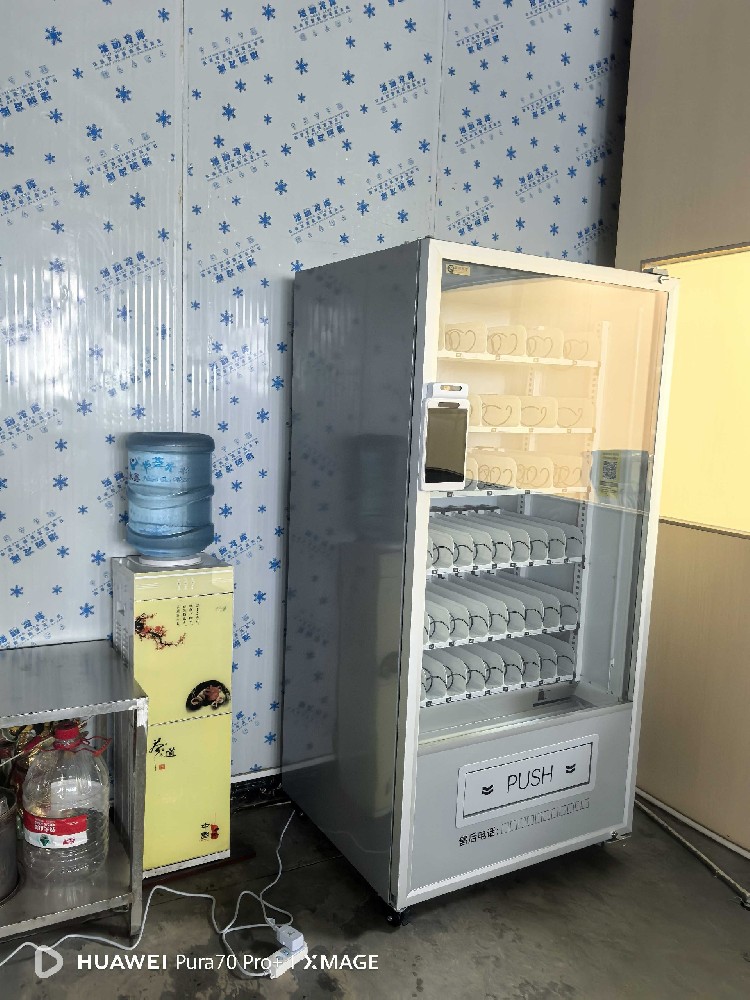In today's era of rapid digital and intelligent development, vending machines have long bid farewell to the traditional extensive operation mode, and intelligent management has become the key to improving their operational efficiency. Through a series of advanced intelligent technology applications, vending machines have achieved precise control and efficient operation in various aspects such as product management, equipment maintenance, and marketing strategies, injecting new vitality into this traditional retail terminal, making it stand out in fierce market competition, providing consumers with better services, and creating greater value for operators.
1、 Intelligent inventory management - precise control of product supply
(1) Real time monitoring of inventory
In the past, inventory management of vending machines relied on regular manual inspections, which not only resulted in low efficiency but also prone to oversights, leading to frequent stockouts or backlogs. Nowadays, with the help of IoT technology, vending machines are equipped with various sensors such as weight sensors, photoelectric sensors, etc., which can sense changes in the quantity of goods in real time. Taking the weight sensor as an example, it can accurately determine the remaining quantity based on the decrease in the weight of the goods placed on the aisle. Once the remaining quantity of the goods reaches the preset replenishment threshold, the system will immediately send a replenishment reminder to the operation personnel to ensure that the goods will not be out of stock, so that consumers can always buy the goods they like.
(2) Intelligent prediction of sales volume
The intelligent management system also has strong data analysis capabilities. By collecting and analyzing past sales data, it can combine different factors such as time, location, season, and consumption scenarios to accurately predict future product sales trends. For example, in the school setting, it was found through analysis that the sales of stationery products and refreshing drinks would significantly increase during exam weeks; In the vending machines around the office building, there is a strong demand for snacks and coffee in the afternoon on weekdays. Based on such predictions, operators can prepare replenishment plans in advance, arrange product inventory reasonably, avoid unnecessary inventory backlog, and reduce sales opportunities lost due to stockouts, greatly improving the efficiency and accuracy of inventory management.
2、 Intelligent equipment maintenance - ensuring stable operation of machines
(1) Fault warning and remote diagnosis
Long term operation of vending machines inevitably leads to various malfunctions, and traditional troubleshooting methods often rely on waiting for customer feedback or manual inspections to detect them, which undoubtedly delays repair time and affects customer shopping experience. The intelligent management system is equipped with a fault warning mechanism, which can monitor the operating status of various components of the vending machine in real time, such as motors, payment systems, refrigeration or heating equipment, etc. Once an abnormality is detected in a component, the system will quickly send the fault information to the operation personnel and provide detailed fault diagnosis reports. Some intelligent systems can even directly locate the fault point, making it convenient for maintenance personnel to prepare repair tools and accessories in advance, remotely conduct preliminary troubleshooting and handling of some faults, achieve rapid response, minimize machine downtime, and ensure stable operation of the vending machine.
(2) Automatic maintenance reminder
In addition to fault warning, the intelligent management system can also automatically generate equipment maintenance reminders based on factors such as the duration of use and frequency of operation of the vending machine. For example, reminding operators to clean and lubricate the cargo aisle every certain operating cycle, and regularly maintaining and testing the refrigeration system to ensure that all equipment components are in good working condition. Through this preventive maintenance measure, not only can the service life of the vending machine be extended and the failure rate of the equipment be reduced, but its overall operational efficiency can also be further improved, allowing the machine to continue providing reliable services to consumers.
3、 Intelligent Marketing Strategy - Accurately Reaching Target Customers
(1) Personalized recommendations
With the help of big data analysis and artificial intelligence algorithms, vending machines can gain a deep understanding of each consumer's purchasing behavior, preferences, and historical purchase records, and provide personalized product recommendations for them. Imagine when a consumer who frequently purchases a certain brand of sugar free beverages approaches a vending machine, the screen will prioritize displaying other sugar free beverages or low calorie snacks from that brand. This thoughtful and accurate recommendation is like having a dedicated shopping assistant nearby, greatly increasing the likelihood of consumers purchasing recommended products, as well as increasing the average order value and customer loyalty, making marketing activities more targeted, achieving precise marketing, and improving overall sales efficiency.
(2) Dynamic pricing strategy
The intelligent management system can also flexibly adjust product prices based on market supply and demand, product sales popularity, time periods, and other factors. For example, vending machines in tourist attractions can increase the prices of popular drinks and snacks during peak tourist seasons or peak periods of the day; During the off-season or when there are few tourists, lower prices to stimulate consumption. Alternatively, for the initial launch of new products, in order to attract consumers to try, lower promotional prices can be set, and normal pricing can be restored after market acceptance increases. Through this dynamic pricing approach, operators can better adapt to market changes, achieve maximum revenue, and also meet the consumption psychology and needs of different consumers in different situations.
4、 Intelligent operation data analysis - scientific decision-making based on evidence
(1) Multi dimensional data insights
The intelligent management system for vending machines can collect massive amounts of data, covering multiple dimensions such as transaction data, customer behavior data, and device operation data. By integrating and analyzing these data, operators can clearly understand the operational status of vending machines in different regions and scenarios, such as which locations have the highest sales, which products are most popular in specific scenarios, and the distribution pattern of customer purchase time periods. These in-depth insights provide operators with a comprehensive market perspective, enabling them to identify strengths and weaknesses in their operations and provide strong data support for subsequent decision-making.
(2) Optimize resource allocation
Based on in-depth analysis of operational data, operators can make more scientific decisions and optimize resource allocation. For example, based on the sales performance and profit contribution of each vending machine, adjust the placement layout reasonably and allocate more resources to high-yield areas and scenarios; Based on the sales data of the product, eliminate unsold items and introduce new products that better meet market demand; At the same time, according to the flow of people and consumption characteristics at different time periods, adjust the business hours and marketing activity arrangements of vending machines, so that all aspects of operation can closely focus on market demand and data feedback, and improve overall operational efficiency and profitability.
In short, intelligent management of vending machines is the secret to improving operational efficiency. Through intelligent applications such as inventory management, equipment maintenance, marketing strategies, and operational data analysis, vending machines have achieved a transformation from passive operation to active control. Operators can manage vending machines in a more scientific and efficient way, providing consumers with more convenient and personalized shopping experiences, demonstrating stronger competitiveness in the retail market, and creating greater commercial value. It can be said that intelligent management is leading the vending machine industry towards a new stage of development, and the potential for the future is limitless.
Have you ever felt the convenience brought by the intelligent management of vending machines? Welcome to share and exchange in the comment section!



